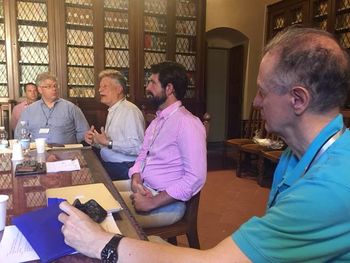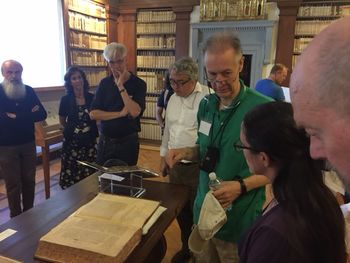Ninth Enoch Seminar (2017 Camaldoli), conference
The Ninth Enoch Seminar (June 18-23, 2017), is an international conference organized by the Enoch Seminar.
< ... -- Eighth Enoch Seminar -- Ninth Enoch Seminar -- Tenth Enoch Seminar -- ... >
Ninth Enoch Seminar Overview
Theme: “From tôrāh to Torah: Variegated Notions of Torah from the First Temple Period to Late Antiquity”
Chairs: William M. Schniedewind (University of California at Los Angeles) and Jason M. Zurawski (University of Groningen), in collaboration with Gabriele Boccaccini (Director of the Enoch Seminar).
Date: June 18-23, 2017
Place: Monastero di Camaldoli, Camaldoli, Italy
Area of Focus:
The Enoch Seminar and the resultant volume will examine the diverse understandings of tôrāh, beginning with the texts of the Hebrew Bible through to the Second Temple period and late antiquity, moving beyond traditional paradigms such as the early usage of tôrāh as general instruction vs. the transition to nomos, as “law,” or the development of a “normative” notion of Torah (capitalization intentional) in the Second Temple period. Participants are encouraged to rethink our scholarly assumptions and preconceptions on the topic and tackle the questions anew in light of more critical philological and historical approaches. We seek to examine the various notions of tôrāh (and nomos) in all relevant literature, regardless of scholarly or denominational corpora, both within ancient Jewish/Judean traditions and in light of broader influences, whether Egyptian, Mesopotamian, Greek, Roman, Persian, etc. As this meeting follows and builds upon the work from the Fifth Nangeroni Meeting, “Second Temple Jewish Paideia in its Ancient Near Eastern and Hellenistic Contexts” (June/July 2015), discussions pertaining to the connections between tôrāh/Torah/nomos/dat and education, pedagogy, wisdom, etc., are especially encouraging. Our aim will be to discuss the variety of ways that tôrāh was defined and developed in the literature.
Registration
Registration for invited participants is now online. Please complete your registration here by February 28, 2017.
Attendance at the Enoch Seminar is by invitation only and is limited to university professors and scholars in the field. If you are interested in attending or participating in the Ninth Enoch Seminar, please contact Jason Zurawski.
All participants are expected to pay the registration fee, which will range from $0 - $225, depending on the participant's past involvement in Enoch Seminars or Nangeroni Meetings. Spouses and guests of participants are not required to pay the registration fee.
Lodging
Contribution (including 5 nights lodging and meals), To be paid in Camaldoli at the Seminar (Estimate, prices may still vary):
- 0: Authors of major papers
- 200 euros: Respondents
- 250 euros: Guests, spouses, etc. (children under 10 years old: free)
- 300 euros: All other participants
Schedule
SUNDAY 18 JUNE 2017
17:00 -- Bus from Arezzo station to Camaldoli
19:30 -- Dinner
20:30-21:30 -- Opening Session & Welcome
- Welcome by Gabriele Boccaccini and Jason Zurawski
- State of the Question by William Schniedewind
MONDAY 19 JUNE 2017
8:30 -- Breakfast
9:15-10:45 -- Major Paper Session 1
- Jacqueline Vayntrub, “Torah as Speech Performance in Pentateuchal Narrative”
- Introduction: Jacqueline Vayntrub (10 min.)
- Response: Lester Grabbe (15 min.)
- Moderated Discussion: 65 min.
10:45-11:15 -- Coffee Break
11:15-12:45 -- Major Paper Session 2
- Stefan Schorch, "The Early Textual History of the Samaritan Pentateuch"
- Introduction: Stefan Schorch (10 min.)
- Response: Magnar Kartveit (15 min.)
- Moderated Discussion: 65 min.
13:00 -- Lunch
15:45-17:15 -- Short Paper Session 1
Group A:
- Bob Hall, “Sirach and Law: Inquiry via Enigma”
- Juan Carlos Ossandón, “Variegated Notions of Torah: The Prologue to Ben Sira and 4 Ezra”
- Jonathan Vroom, “The Authorities of Torah: Notions of Torah in Ezra-Nehemiah and Ben Sira”
Group B:
- Federico Dal Bo, “Paul’s Definition of ‘Circumcision of the Heart’: A Trans-Cultural Reading of Rom 2:29”
- Jason Myers, “The Wisdom of Pseudo-Phocylides and Pauline Paraenesis: An Ethical Comparison of the Sentences & Rom 12:9-21; 13:8-10”
- Valérie Nicolet, “Children, Slaves, Foreigners, Women, Eunuchs: Rhetorical Representations of Nomos in Galatians”
- Jeremy Punt, “Paul and νομός, and broader perspectives: Rom 13:8-10 as case study”
17:15-17:45 -- Coffee Break
17:45-19:15 -- Major Paper Session 3
- Benjamin Wright, “Where is the Torah in Ben Sira?”
- Introduction: Benjamin Wright (10 min.)
- Response: Francis Borchardt (15 min.)
- Moderated Discussion: 65 min.
19:30 -- Dinner
TUESDAY 20 JUNE 2017
8:30 -- Breakfast
9:15-10:45 -- Special Session, Review of Christine Hayes, What’s Divine about Divine Law?
- Introduction: Christine Hayes (5-10 min.)
- Review 1: Michael Legaspi (10-12 min.)
- Review 2: Carol Bakhos (10-12 min.)
- Response: Christine Hayes (5-10 min.)
- Moderated Discussion: 45-60 min.
10:45-11:15 -- Coffee Break
11:15-12:45 -- Major Paper Session 4
- Lutz Doering, “Torah and Halakhah in the Hellenistic Period”
- Introduction: Lutz Doering (10 min.)
- Response: Michael Satlow (15 min.)
- Moderated Discussion: 65 min.
13:00 -- Lunch
14:30 -- Visit to the monastery and walking tour to the Hermitage
19:30 -- Dinner
WEDNESDAY 21 JUNE 2017
8:30 -- Breakfast
9:15-10:45 -- Major Paper Session 5
- Gabriele Boccaccini, “Torah and Apocalypticism in the Second Temple Period”
- Introduction: Gabriele Boccaccini (10 min.)
- Response: William Schniedewind (15 min.)
- Moderated Discussion: 65 min.
10:45-11:15 -- Coffee Break
11:15-12:45 -- Short Paper Session 2
Group A:
- Calum Carmichael, “The Woman Taken in Adultery and Jesus’ Writing on the Ground (John 8:2-11)”
- Crispin Fletcher-Louis, “Jesus’ Messianic Torah in Mark 2-3”
- Rivka Nir, “John the Baptist, the Law (Torah), and the Parting of the Ways”
Group B:
- Marianne Dacy, “The Binding of Isaac”
- Antti Laato, “The Book of the Wars of Yahweh”
- James Watts, “From the torah of polluted and inedible meats to diet as a marker of Jewish identity”
13:00 -- Lunch
15:45-17:15 -- Short Paper Session 3
Group A:
- Francis Borchardt, “Torah for the Moment: Understanding Torah in a Performative Context”
- David Lambert, “Tôrāh as Mode of Conveyance: The Problem with both ‘Instruction’ and ‘Law’”
- Michael Satlow, “Torah: The Material Evidence”
Group B:
- Jack Collins, “Authority without Text, Torah without Law: the Strange Case of Jubilees”
- Paul Mandel, “From safar data' to sofer da'at: The Transformation of torah from Law to Text”
- Cana Werman, “The Two Covenants: An Interpretation of the 4Q158 Fragments”
17:15-17:45 -- Coffee Break
17:45-19:15 -- Major Paper Session 6
- Joachim Schaper, “The ‘Stoic’ Solomon: From Torah to Nomos in the Hellenistic Age, from the Perspective of the Wisdom of Solomon”
- Introduction: Joachim Schaper (10 min.)
- Response: Jason Zurawski (15 min.)
- Moderated Discussion: 65 min.
19:30 -- Dinner
THURSDAY 22 JUNE 2017
8:30 -- Breakfast
9:15-10:45 -- Short Paper Session 4
Group A:
- Anne Kreps, “tôrāh? Torah? Flora!: Ptolemaeus Gnosticus' Theory of Divine Law”
- Michael Legaspi, “Nomos Human and Divine in Wisdom of Solomon”
- Anders Klostergaard Petersen, “From Torah to Torahisation: a Durkheimian and Biocultural Evolutionary View on the Israelite-Jewish Religion”
Group B:
- Oliver Dyma, “Prophets – Levites – Scribes and their Role in the Transmission of the Torah”
- Magnar Kartveit, “Possible Ideological Tendencies in the MT, the LXX, and the SP”
- Patrick Pouchelle, “From tôrāh to νόμος: How the Septuagint enlightens the process that leads the word tôrāh to the concept of Torah”
10:45-11:15 -- Coffee Break
11:15-12:45 -- Special Session, Mauro Perani, Torah mss from the Biblioteca Universitaria di Bologna
13:00 -- Lunch
15:45-17:15 -- Major Paper Session 7
- Steven Fraade, “‘Enjoin Them upon Your Children to Keep’ (Deut. 32:46): The Intergenerational Fragility of ‘Words of Torah’”
- Introduction: Steven Fraade (10 min.)
- Response: Ishay Rosen Zvi (15 min.)
- Moderated Discussion: 65 min.
17:15-17:45 -- Coffee Break
17:45-19:15 -- Wrap-up Session: Closing thoughts. Future directions.
19:30 -- Dinner
FRIDAY 23 JUNE 2017
Departures
7:00 -- Bus from Camaldoli to Arezzo Station
8:30 -- Breakfast
Participants
- Thomas Babu (Serampore University, India)
- Carol Bakhos (University of California, Los Angeles)
- Andreas Bedenbender (Paderborn University)
- Gabriele Boccaccini (University of Michigan)
- Francis Borchardt (Lutheran Theological Seminary of Hong Kong)
- Calum M. Carmichael (Cornell University)
- Esther G. Chazon (Hebrew University of Jerusalem)
- Suzana Chwarts (Universidade de São Paulo)
- Jack Collins (Mercy College)
- Marianne Dacy (University of Sydney)
- Federico Dal Bo (Universitat Autònoma de Barcelona)
- Lutz Doering (University of Münster)
- Oliver Dyma (Katholische Stiftungsfachhochschule München)
- Crispin Fletcher-Louis (Whymanity)
- Steven D. Fraade (Yale University)
- Pablo González-Alonso (Universidad de Navarra, Spain)
- Lester L. Grabbe (University of Hull)
- Robert G. Hall (Hampden-Sydney College)
- Christine Elizabeth Hayes (Yale University)
- Magnar Kartveit (VID Specialized University)
- Anne Kreps (University of Oregon)
- Antti Laato (Åbo Akademi University)
- David Lambert (University of North Carolina at Chapel Hill)
- Michael Legaspi (Penn State University)
- Paul Mandel (Schechter Institute of Jewish Studies)
- Fernando Milán (Universidad de Navarra, Spain)
- Jason Myers (Greensboro College)
- Valérie Nicolet (Institut protestant de théologie, Paris)
- Rivka Nir (Open University of Israel)
- Juan Carlos Ossandón (Pontificia Universitas Sanctae Crucis)
- Anders Klostergaard Petersen (Aarhus University)
- Patrick Pouchelle (Centre Sèvres – Paris)
- Jeremy Punt (Stellenbosch University)
- Ishay Rosen Zvi (Tel Aviv University)
- Michael L. Satlow (Brown University)
- Joachim Schaper (University of Aberdeen)
- William M. Schniedewind (University of California, Los Angeles)
- Stefan Schorch (Martin-Luther-Universität Halle-Wittenberg)
- Jacqueline Vayntrub (Brandeis University)
- Jonathan Vroom (University of Toronto)
- James Watts (Syracuse University)
- Cana Werman (Ben Gurion University of the Negev)
- Benjamin G. Wright (Lehigh University)
- Jason M. Zurawski (University of Groningen)
Getting to the Seminar
Foresteria del Monastero di Camaldoli (site of Seminar and accommodations)
Località Camaldoli, 52010 Camaldoli
Tel. 0575/556013
Fax 0575/556001
foresteria@camaldoli.it
www.camaldoli.it
You may fly in to either Florence, Rome, or Bologna. You will then take the train to Arezzo.
- From the Florence Airport (Peretola), you will need to take a bus/cab to the main train station, Santa Maria Novella, then the train to Arezzo.
- From Rome (Fiumicino), you will take the train to Roma Termini, then to Arezzo.
- From Bologna (Guglielmo Marconi), you will take the bus/taxi to Bolgona Centrale and from there to Arezzo.
- Try to avoid local trains which stop at every station and therefore take much longer. Look for high-speed, intercity, or frecciarosa trains.
We are scheduling a bus to take us from Arezzo to Camalodoli on Sunday, June 18. The bus will leave the train station at 17:00.
- Meet at the Arezzo train station, at the bar/café, to be ready to leave by 16:45.
- If you are unable to make this bus, you can take the bus from Arezzo to Bibbiena. See the schedule here.
- From Bibbiena, you can take a taxi to Camaldoli (~20-30 euros).
You may also take a taxi directly from Arezzo to Camaldoli, but this will be more expensive.
Please check the Trenitalia website (http://www.trenitalia.com) for up to date train schedules and travel times.

